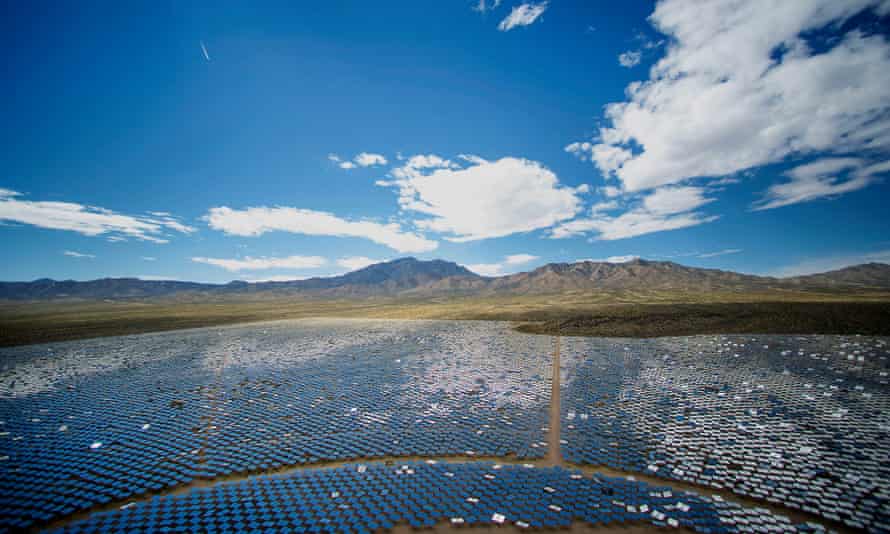Joe Biden has closed out a two-day climate summit of more than 40 world leaders by warning that the planet risks reaching the “point of no return” if more isn’t done to escalate efforts to constrain the climate crisis.
Biden, along with several other national leaders, made a number of new promises in the summit. Here’s what it all means.
What has Joe Biden promised at the summit?
As its centerpiece announcement, the Biden administration has said planet-heating emissions will be cut by 50%-52% by 2030. The target was officially submitted to the United Nations as part of an overarching global system where countries submit voluntary emissions reduction goals in order to collectively avoid dangerous global heating.
On top of this, the summit saw an American promise to double financial aid for developing countries struggling with the escalating droughts, floods, heatwaves and other impacts of the climate crisis, as well as a new US push to work with other countries on clean energy innovation.
The White House hopes the new commitments will spur other countries to do more, as well as signal the return of the US to the top table to climate leadership after a ruinous self-imposed exile under Donald Trump.
Is that enough to deal with the threat of climate change?
No. But then very little at this stage is sufficient. Despite decades of warnings from scientists, global greenhouse gas emissions have continued to soar, only dipping last year due to pandemic-related shutdowns. The cuts required to stave off truly disastrous global heating are now precipitously steep – reduce by around half this decade and then to zero by 2050.
Some activists feel the US could be doing more, with a group of protesters dumping wheelbarrows of manure outside the White House on Thursday. The climate aid pledge has also been criticized as “very low” by ActionAid USA.
Conversely, the US goal is one of the most ambitious for a developed country, will make a significant dent in overall emissions and has generally been received as striking the right balance between ambitious and feasible by governments desperate to see the world’s largest economy rejoin the climate battle.
“Is it enough? No,” said John Kerry, Biden’s climate envoy. “But it’s the best we can do today and prove we can begin to move.”
How will big reductions in emissions change Americans’ lives?
Emissions have been gradually declining in the US for several years, largely due to the collapse of the ailing coal industry. Cutting emissions in half within a decade will require far more aggressive, and noticeable, changes – an explosion in solar and wind jobs, a rapid shift to electric cars, the refitting of energy inefficient buildings, the demise of coal country, a revamp of farming practices.
Biden has framed this unprecedented transition as a glorious economic opportunity – “when I think of climate change, I think of jobs” has become a presidential slogan – and while experts agree that millions of new jobs can flow from a shift to clean energy the change will be jarring to some, particularly those working in fossil fuels.

Regulations to force oil, coal and gas out of the energy system, along with mandates for electric cars, will have to materialize. But the climate problem is manifest – if the US is to get to net zero emissions by 2050 the focus at some point will shift to everything from airline and shipping emissions to gas stovetops in homes to whether a switch away from meat eating could help lower the sizable methane pollution from cattle.
Biden’s task is to help accelerate a shift already under way to renewables while cushioning the blow to those left by the wayside, all while avoiding a backlash from an American public wary of personal sacrifice.
How likely is it Biden will be able to deliver this?
There are record levels of alarm among the American public over the climate crisis, with majorities of Democratic and Republican voters supporting action to bring down emissions. Big business, unions and city leaders have also swung strongly behind the push for a federal response.
Imposing barriers remain in Congress, however, where Republicans have clung on to Trump-era rhetoric that acting on the climate crisis will harm the economy. The Biden climate target will put “good-paying American jobs into the shredder,” warned Mitch McConnell, the Republican Senate leader.
Biden will be able to unilaterally shut off new oil and gas drilling on public lands and set new pollution standards for cars and power plants, but further legislation will be required. Given the paper-thin Democratic control of Congress, the fate of even broadly popular measures such as Biden’s $2tn infrastructure plan – which would greatly expand electric vehicle charging stations, boost public transit and push forward renewable energy deployment – appear uncertain.
At some point Biden will have to bring in “sticks” as well as “carrots”, such as a tax on carbon emissions and a directive to utilities to phase out fossil fuels. Again, such measures face huge hurdles in Congress.
If he does get all of that done, is it problem solved?
As the administration is keen to point out, the rest of the world is responsible for about 85% of all emissions and only through a coordinated, determined international effort will humanity avoid the punishing ravages of the climate crisis.
Canada and Japan announced upgraded emissions reduction targets at the climate summit but China, the world’s leading carbon polluter, didn’t bring anything new and some countries, such as Brazil and Australia, have deeply recalcitrant leaders. Ahead of key UN climate talks in Scotland later this year, Biden will not only have to corral an unusually divided domestic polity to achieve his goals but also prod other countries to do more. It’s an unenviable task.

Average Rating